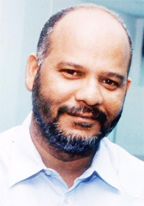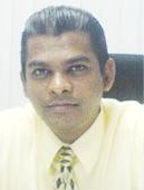Weak security measures that have seen drugs slipping through Guyana’s international airport yesterday saw stakeholders involved in the administration and security of that port putting their heads together in an attempt to plug the gaps the drugs have been pouring through.

Minister of Home Affairs Clement Rohee and Minister of Transport Robeson Benn joined representatives from the Cheddi Jagan International Airport, Timehri, the police, the Customs Anti Narcotic Unit (CANU), baggage handlers, the Guyana Revenue Authority and those from the airport itself in the airport’s conference room in an attempt to stem the tide.
According to the CEO of the airport Ramesh Ghir the one-day workshop was to allow them, “to sit down and relook at what we have been doing, what we have implemented in the past few months and see how best we can improve this system.”
The workshop came on the heels of 40 pounds of cocaine slipping through the airport and being intercepted at the JFK airport and back in January there was the infamous case of 50 pounds of cocaine slipping by in a pink suitcase. Two women are sitting New York jails for the two busts while four persons have been charged locally. Three are challenging the charges on the grounds of malicious prosecution by Director of Public Prosecutions (DPP) Shalimar Ali-Hack. Local authorities are still investigating the 40-pound bust and no one has been charged locally.
Also, just last week in the presence of Rohee and members of the security agencies the two sniffer dogs at the airport, Argon and Lacy, failed to sniff out cocaine planted in the compound of the Ministry of Home Affairs. Sources have since indicated that the Guyana Police Force will not have to get new dogs and while none of those who addressed yesterday’s workshop mentioned the issue, sources said the police should have picked up that something was wrong with the dogs. It was only on one occasion, according to one of their handlers, that one of the dogs caught someone with cocaine. On that occasion the drug trafficker had admitted that she had snorted cocaine and not washed her hands before heading to the airport.
Spotlight
In his remarks at the opening of the workshop, Ghir said that over the past few months the security operation at the airport has been in the spotlight and there have been a lot of questions about the security systems and procedures in place. He said as the head of the airport and as the chair of the airport security committee he could safely say that “most of the systems and procedures in place are adequate, of course we know that there is always room for improvement.” Ghir said the fact that there is need for improvement forced them to convene the workshop “to sit down and evaluate” and they would look at the procedures to see how best they can improve.

Rohee, who said he was very emotional on the issue as he believes that Guyana must always be a country that people must respect and can point to as one that is raging “a heroic fight against drug trafficking”, pointed out that three of the most important factors at any airport are the technology, law enforcement and criminal elements and they must be taken into consideration when anticipating an integrated attempt at an airport.
“The CJIA is no exception from other airports around the world, it is confronted with similar challenges… and the main challenge in the world today that confronts most airports is the challenge to the law enforcement agencies and to the technology as well by those who seek to use the airport as a medium to perpetuate their criminal activities,” Rohee said.
He noted that at the top of the list of criminal activities is narcotics followed by the use of false identification, smuggling of persons, terrorists’ threats among others.
Emboldens
Rohee questioned what emboldens the masterminds behind the smuggling of narcotics at the airport and suggested that it is because their rate of success is great and they have a number of persons at the airport in their “pockets” who would ensure that their “dirty drugs” will be allowed out of the country.
“I have always maintained that the most critical factor in the chain of security elements is the human factor,” Rohee said. “Government can spend millions to ensure that the best technology is installed at the airport, that the law enforcement agencies are equipped with the most modern pieces of equipment to detect the narcotics, the firearms, the bomb, the grenade or whatever the case might be. But notwithstanding the spending on all these resources [they] can malfunction if someone was paid to ensure that they did not function or someone was paid to make sure that they function in a way to allow the drugs to leave the airport.”
The minister stressed that the answer lies in the maintenance of the “integrity” and the “cleanliness” of all those who are vested with the authority to ensure that the drug traffickers do not take advantage of whatever loopholes exist at the airports. He indicated that at the end of the meeting the answers to those questions should be provided while adding that it is because the government recognises the challenge and the need to address the human factor in the security sector that it embarked two years ago on polygraphing persons who work in the security sector.
“We will continue to polygraph persons notwithstanding those critics who all they can do day and night is to sit back to say nothing or do nothing but to criticize and to say that this can’t work and that can’t work and so forth,” the minister said.
According to Rohee, international cooperation is very important and as such the government never wastes the opportunity when it presents itself, to send persons in the security sector abroad for training. This training is seen as an investment in the country since the persons trained will bring back the knowledge and experience garnered to improve the local sector.
“The bottom line is any Guyanese… who colludes with a drug lord, whoever they might be male or female… in facilitating drugs leaving our country through CJIA… I will deem such a person as unpatriotic because no patriot, no nationalist who believes in their country, who wants their country prosper, who wants to see the Guyana flag always held high and be respected would ever indulge indiscretion. And therefore it is a question of national self respect… that we must always… be committed to insofar as this fight is concerned,” the minister said.
From the top
“There is no individual who could point a hand to any government minister to say that government minister is associated with this activity, and if the example is being set from the top as we usually expect to happen then we must follow the line to ensure that those who fall under the leaders at the top they also… should not have a finger pointed at them,” he said.
Benn in his remarks said there are ongoing security issues at the airport as is the case at any international airport worldwide and there must be a constant focus on the security arrangements.
He said there are several security matters that have to be looked at such as terrorism and backtracking but he admitted that for Guyana over the past few months there have been “the ongoing issues relating to drugs.
“We would always have these issues. I believe the question is how well we handle these issues; to what extent they occur… the fact that we need to pay constant attention to this problem and as we are attempting to do now to integrate all of our efforts with respect to this particular problem,” Benn said.
“I would say on the simplest of statistical observations that it would appear that if there is a certain frequency of occurrence of these events that there is some viability… in respect of this activity with respect to those persons who are undertaking the activity through the airport.”
He continued that it is the question of viability for drug trafficking at the airport that needs to be addressed and it has to be eliminated, as, if this is not done and the exportation continues with the same frequency and quantity then it could mean that the authorities are only seeing about 10% of what actually goes through the airport.
“We are blighted by this issue of drugs in the country,” Benn said. “We are not a producer… we are afflicted by this thing, this bad habit perhaps of some larger and well-known countries and it is a severe and maybe onerous in some respect activity that we have to undertake.”




